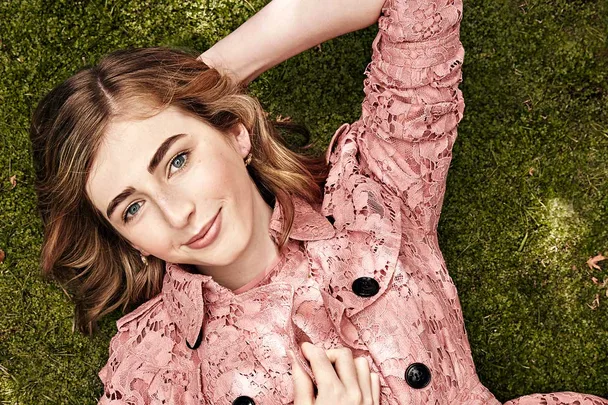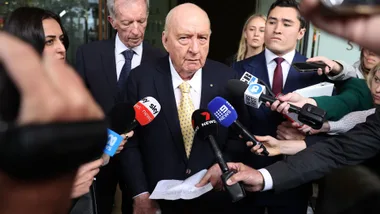Model Theodora ‘Teddy’ Quinlivan is a face of Chanel Beauty and Georgie Stone (pictured above) plays the first-ever transgender character on Australia’s longest-running television drama, Neighbours. Trans visibility is on the rise, yet a glance at the mental health data shows transitioning remains a deeply challenging issue.
An estimated 45,000 Australian schoolchildren currently identify as transgender, and the number seeking to transition is climbing fast. But a 2017 report by the Telethon Kids Institute found almost 80 per cent of trans young people (aged 14–25 years) had self-harmed. Tragically, 48 per cent had attempted suicide. For others – the lucky ones – transitioning is defined by relief, elation and great support, their stories proving a harbinger of hope for the future.
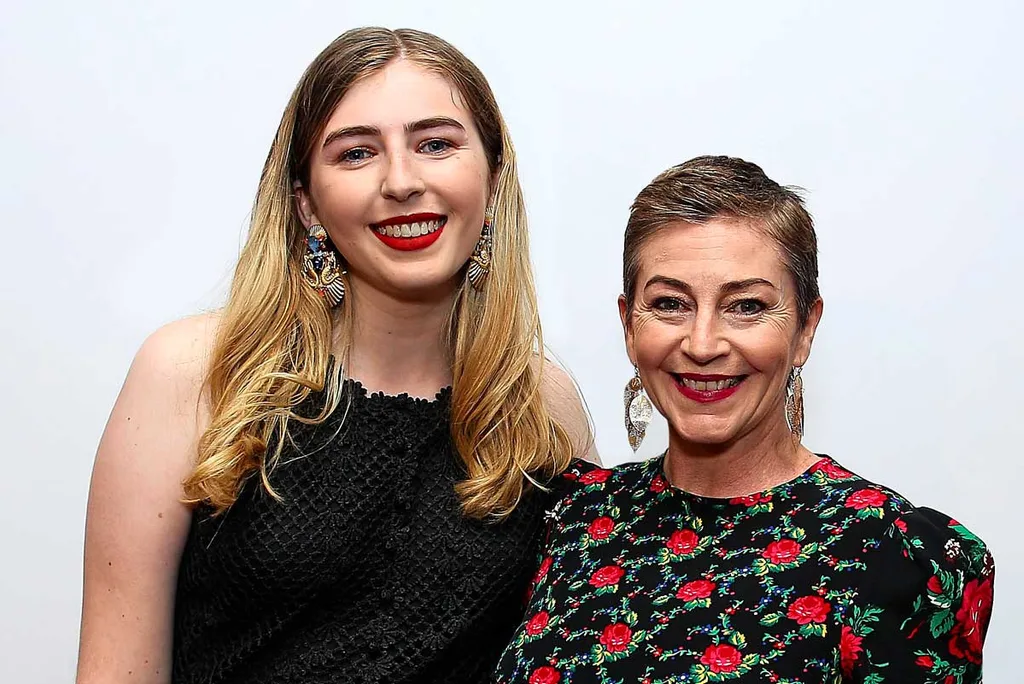
Georgie Stone & Rebekah Robertson
Georgie, 20, was assigned male at birth and began taking puberty-blocking medication aged 10. Since then, she’s fearlessly campaigned for trans rights, and in 2019 she became Neighbours’ first trans character and cast member. Her mother Rebekah is the founder of Transcend, a parent-led peer support network for the families of transgender children. This year, the duo received Australia Day honours for their advocacy.
Georgie’s Story
“When I was 11, my mum showed me a story in marie claire about an American journalist called Janet Mock who was trans. That was something I’d never seen before: a positive representation of a trans person, who was beautiful and successful and living her best life. It gave me a sense of hope and it showed me that my future could be brighter than I thought it was going to be.
“Until that point, I thought I’d never tell anyone [outside her family] I was trans because there was no other option. As a child, I felt like a mythical creature. I felt like there was something wrong with me and that people would think I was a freak.
“It was hard for me growing up, despite being really lucky with my family. Mum has been with me every step of the way, while my twin brother Harry is my biggest supporter – even when we were seven years old he’d [correct] people if they didn’t use the right pronoun for me.
“Dad didn’t quite understand it at first, but that all came from a place of wanting me to be safe. As soon as he realised that the best way to do that was to support me and let me be who I am, he went out and bought me my first dress. It was a tiny little sundress with spaghetti straps and flowers. I loved it.
“Today I play Mackenzie Hargreaves on Neighbours. I know what it’s like to grow up and not have anyone to look up to; I had no-one to show me that I could be who I really was. That was so scary. I hope trans young people can watch me and realise they’re not the problem, and be proud of themselves.”
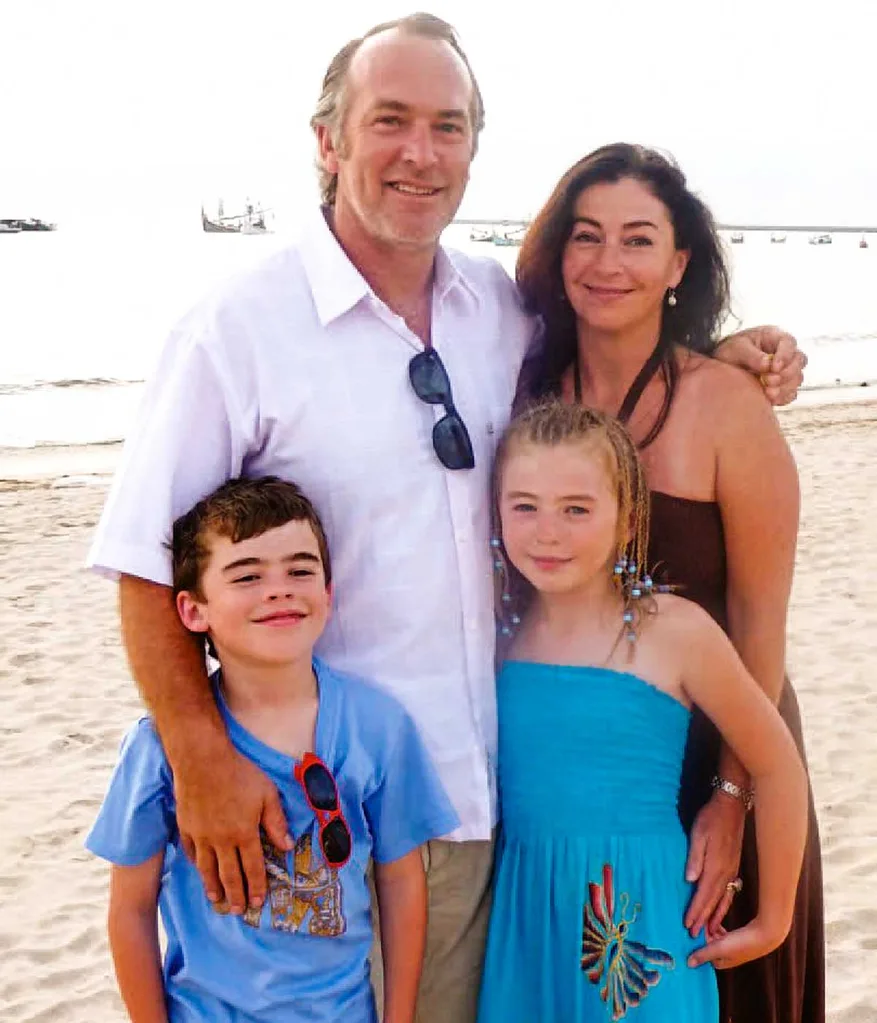
Rebekah’s Story
“When Georgie was little, it was a really scary, isolating time as a parent, because there was so little information about trans kids. I felt incredibly overwhelmed and really scared for her future. The hardest part was sending her off to school and wondering if she was going to get bullied that day. It’s confronting to know that throughout her life, she’ll be discriminated against in both overt and subtle ways. Georgie doesn’t deserve that. Nobody deserves that.
“One of the things I grieve is not the loss of a son or even the loss of an idea; what I grieve is the loss of simplicity for my child. But her life is a testament to her character and integrity – Georgie is such an incredible young person.
“Our family launched an appeal to remove the Family Court of Australia from medical decisions for trans adolescents. I hear parents of trans kids sometimes say they feel guilty that they’re not out there publicly advocating, too. But I feel the best form of advocacy as a parent is to raise a healthy child who is excited for their future. When you do that, you bring an entire community with you: you bring your family, friends, school and sporting clubs along. [These people] become part of a village that raises your child; they form the protective and affirming force. They become allies. To love and listen to your child is the first step in protecting them from harm.”
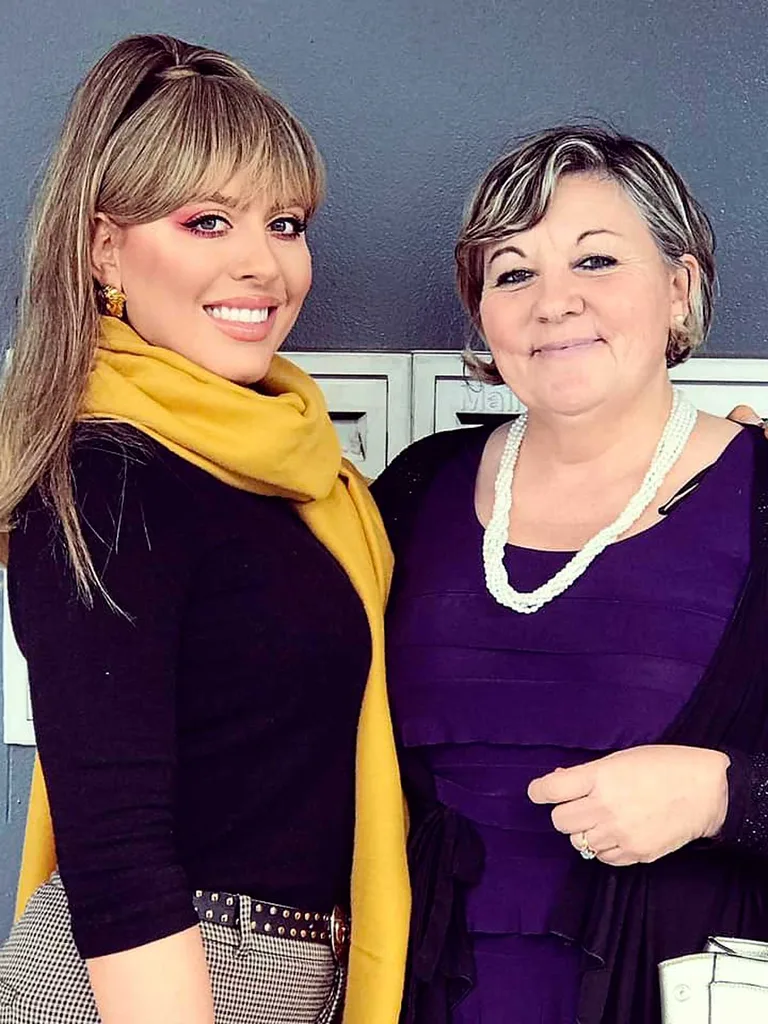
The Paez Family
Skye, 34, and Dannii, 21, were assigned male at birth and raised in western Sydney by evangelical Christian parents. At 26, Skye decided to start transitioning, and Dannii soon began the same process. Their mother, Jessica, originally struggled with their transition, and other family members disowned the pair.
Skye’s Story
“Growing up, it was hard to be myself. I didn’t even know about trans people back then, but everything that came naturally to me was [deemed] wrong. My family went to an evangelical church that was full-on – they used to say that gay people would burn in hell for eternity. I just remember being petrified and feeling like there was something wrong with me and that I had to keep it a secret because if anyone knew, my family would disown me and no-one would ever love me or accept me.
“By the time I was 16, I was living like a gay guy. But it still didn’t feel right. I realised my problem was that I saw myself in a different way to how other people saw me: I saw myself as a woman. So I started to cross-dress. I remember going to a dress-up party and buying this pink dress from the Salvos store. When I put it on with a wig, I looked in the mirror and thought, ‘Oh my God, this is me!’ For the first time in my life it just felt really right.
“Something I did find shocking when I transitioned is just how hard women have it. I remember going to a party and a female friend saying: ‘Oh, you’ve put on weight.’ Or a guy telling me ‘You should dress sexier.’ As a boy, I’d never get told that sort of thing so bluntly.
“What would I say to a young kid who thought they might be trans? Don’t waste your life – don’t let it go by and not really live it.”
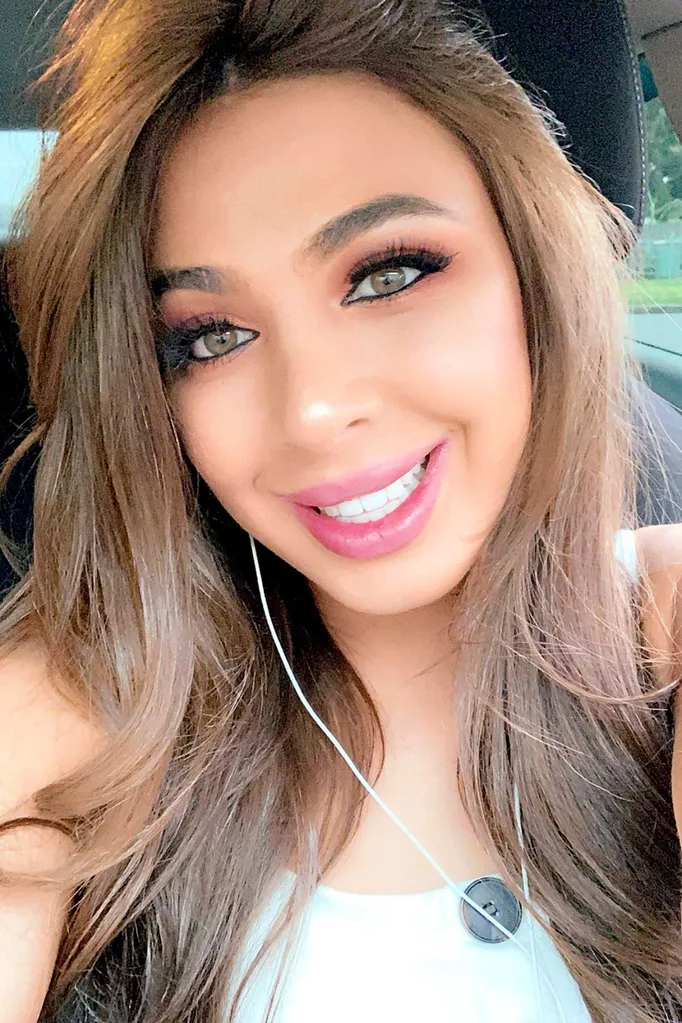
Dannii’s Story
“I started to transition when I’d just turned 14. Having Skye there definitely made it a lot easier because we could talk about everything with each other. We knew what each other was going through.
“There’s also been such a rapid change over the past five years – there’s so much more visibility, particularly with YouTube. Many more young people are coming out as trans because there’s more knowledge out there. Before, if you were feminine, people would just think you were gay.
“Dating is hard. If I was going on Tinder, I wouldn’t say that I was trans. Why should I put myself out there so much? You don’t tell someone all your past history on the first date. You get to know each other – that’s what dating is.”
Jessica’s Story
“At first I wasn’t happy [about my children transitioning]. We’re from South America, where they’re really homophobic and can be very judgemental. A lot of my family don’t talk to Skye and Dannii anymore. They say it’s my fault as a mum.
“Skye was always different and girly. At first I tried to discourage [her transition], because I [thought] it would be hard for her to find love and have children. “I found out about Dannii when I caught her dressing up as a girl. I came into the room and started screaming. I thought, ‘Oh my God, another one!’ But then Dannii started to get depressed. She stopped wanting to eat and was cutting herself. I thought, ‘I’d rather have two daughters than two dead sons.’ I started learning more about trans people and watching YouTube videos. Understanding they are born like that changed my mind. As a mother, you’ve got to help your children.
“Both Skye and Dannii are much happier now and I’m happy that I’ve gained two daughters. But I also lost two sons and I miss them, too.”
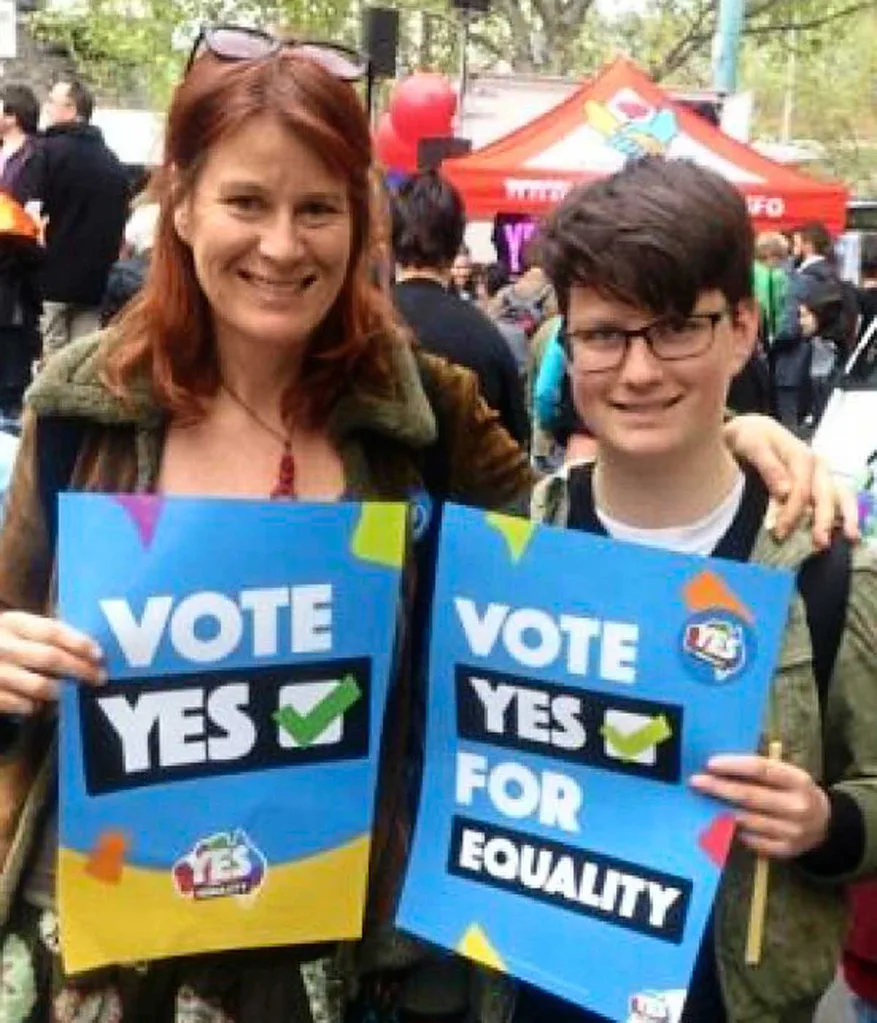
Oliver & Sarah Kipnis
Oliver, 17, was assigned female at birth and started taking puberty blockers aged 10. The overwhelming support of his school and family, including his mum, Sarah, made for a smooth transition, and now he hopes to help other trans children who haven’t been as lucky.
Oliver’s Story
“I always knew what I was, even before I understood about being transgender. Even as a little kid, I presented in a very masculine way. At my primary school, people kind of forgot about the whole boy and girl thing, and just sort of accepted me like one of the guys. In fact, even before I transitioned, any time I went into the female bathroom, people would say, ‘Hey, aren’t you in the wrong toilets?’ I didn’t know what to do, so I stopped drinking water.
“But I know that I’ve had a very, very privileged experience. Obviously being trans can suck and I’ve got to go through stuff that most other people don’t have to. But compared with almost every other trans person I’ve ever met, I’ve had so few problems.
“That’s why I feel I need to talk about the issue and raise awareness. If there are other kids out there who haven’t heard about being trans or don’t understand, then hopefully they can hear my story. If that helps them, it will make it all worth it.”
Sarah’s Story
“As soon as Olly could talk, he told us he felt like a boy on the inside. He used to pull the hairclips out of his hair. I just thought he was a tomboy, so I wasn’t really worried. My kids went to a Steiner kindergarten, so there were a lot of quirky, individual kids. But when he got a little bit older, Olly started to move like a boy, too. He had this kind of boyish swagger.
“The question of whether or not to do something wasn’t really ever a choice for me. Olly was always very clear and sure about it. He never hesitated. As soon as he found out that some kids transition, he said, ‘Well, that’s what I want to do.’
“Working in youth mental health, I was also very aware of the path that some kids go down when their needs aren’t meant. I was aware of the fact the suicide and homeless rates for trans kids are really high. Some other parents wouldn’t have that context.
“Even so, to take your kid to the hospital and see them have an injection to block their puberty is confronting, even if you’re fully supportive of their journey. But once Olly started testosterone, he became even more comfortable with who he is.
“Olly was never bullied or teased at school, he never had a tough time. In fact, he’s sometimes said to me: ‘I don’t really have a story to tell because nothing bad has happened.’ And I say to him, ‘Well, that’s your story. It doesn’t have to be a traumatic journey. Being trans isn’t necessarily a problem in itself, the problem is society around you.’”
If you or someone you know needs help, call Lifeline on 13 11 14, or QLife – which provides LGBTI peer support – on 1800 184 527.
This story originally appeared in the September 2020 issue of marie claire.
